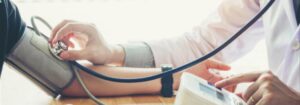 While there are no obvious symptoms of high blood pressure, there are certain warning signs to look out for.
While there are no obvious symptoms of high blood pressure, there are certain warning signs to look out for.
Called the silent killer, high blood pressure is a significant risk factor for heart disease and stroke, which are the leading causes of death in the United States.
Because there are often no obvious symptoms, many people are unaware they have high blood pressure until they experience a severe cardiovascular event. The only way to find out if you have high blood pressure is to have a health care professional check for it. It is worth noting, however, that extremely high blood pressure may cause blurred vision, severe headaches, dizziness, chest pains, shortness of breath, or nose bleeds.
Nobody is immune to developing high blood pressure, but many factors can increase the risk, including:
Family History – High blood pressure can be a family trait. Additionally, salt sensitivities may run in the family, which can increase the risk of high blood pressure.
Race – Hypertension is more prevalent in African Americans than in any other race.
Age – As we age, our blood pressure tends to increase. Approximately 65 percent of the population over the age of sixty has high blood pressure. Studies also show growing numbers of teens and younger children are developing high blood pressure due to poor diet and obesity.
Gender – Men are more likely than women to develop high blood pressure before the age of fifty-five and women more than men after age 55.
We can’t do anything about our family history or age, but we can change the unhealthy habits that increase the risk of developing high blood pressure. A few things you can do to help lower or manage your blood pressure include: quit smoking if you are a smoker, manage stress, limit alcohol consumption, reduce the amount of fat and sodium in your diet, and exercise daily.
If you have high blood pressure or a family history of hypertension, you must learn how to keep your blood pressure in the normal range to prevent the onset of severe medical conditions. Here are some strategies:
Understand and Know Your Numbers – Have your blood pressure checked regularly and during your physical exams.
Recognize Risk Factors – Learn and recognize the factors that may increase your risk of developing high blood pressure.
Make Healthy Choices – Eat a balanced diet containing less fat and less sodium, quit smoking, start a regular exercise routine, and stick to your medication regimen as instructed by your doctor.